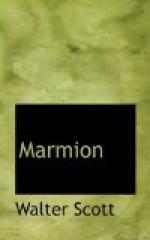line 294. pray you = I pray you. Cp. ‘Prithee,’ so common in Elizabethan drama.
line 298. Scott annotates as follows:-
’The story of Perkin Warbeck, or Richard, Duke of York, is well known. In 1496, he was received honourably in Scotland; and James iv, after conferring upon him in marriage his own relation, the Lady Catharine Gordon, made war on England in behalf of his pretensions. To retaliate an invasion of England, Surrey advanced into Berwickshire at the head of considerable forces, but retreated, after taking the inconsiderable fortress of Ayton. Ford, in his Dramatic Chronicle of Perkin Warbeck, makes the most of this inroad:—
“Surrey.
“Are all our braving
enemies shrunk back,
Hid in the fogges
of their distemper’d climate,
Not daring to
behold our colours wave
In spight of this
infected ayre? Can they
Looke on the strength
of Cundrestine defac’t;
The glorie of
Heydonhall devasted: that
Of Edington cast
downe; the pile of Fulden
Orethrowne:
And this, the strongest of their forts,
Old Ayton Castle,
yeelded and demolished,
And yet not peepe
abroad? The Scots are bold,
Hardie in battayle,
but it seems the cause
They undertake
considered, appeares
Unjoynted in the
frame on’t".’—Scott.
line 301. Ayton is on the Eye, a little above Eyemouth, in Berwickshire.
Stanza xix. line 305. ’The garrisons of the English castles of Wark, Norham, and Berwick were, as may be easily supposed, very troublesome neighbours to Scotland. Sir Richard Maitland of Ledington wrote a poem, called “The Blind Baron’s Comfort,” when his barony of Blythe, in Lauderdale, was harried by Rowland Foster, the English captain of Wark, with his company, to the number of 300 men. They spoiled the poetical knight of 5000 sheep, 200 nolt, 30 horses and mares; the whole furniture of his house of Blythe, worth 100 pounds Scots (L8. 6s. 8d.), and every thing else that was portable. “This spoil was committed the 16th day of May, 1570, (and the said Sir Richard was threescore and fourteen years of age, and grown blind,) in time of peace; when nane of that country LIPPENED [expected] such a thing.”—“The Blind Baron’s Comfort” consists in a string of puns on the word Blythe, the name of the lands thus despoiled. Like John Littlewit, he had “a conceit left him in his misery—a miserable conceit.”
’The last line of the text contains a phrase, by which the Borderers jocularly intimated the burning a house. When the Maxwells, in 1685, burned the castle of Lochwood, they said they did so to give the Lady Johnstone “light to set her hood.” Nor was the phrase inapplicable; for, in a letter, to which I have mislaid the reference, the Earl of Northumberland writes to the King and Council, that he dressed himself at midnight, at Warkworth, by the blaze of the neighbouring villages burned by the Scottish marauders.’—Scott.




